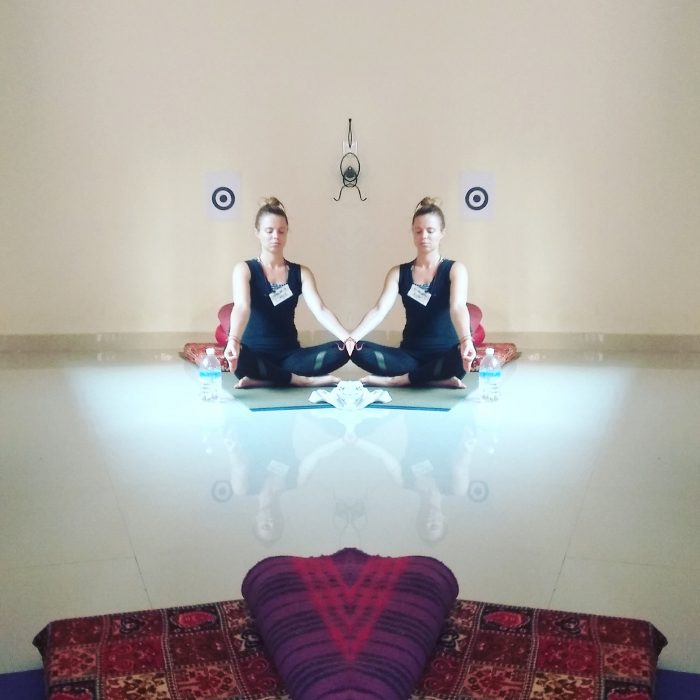

Mantra Yoga
Japa Meditation: Theory
Mantra Yoga is an exact science. Mananat trayete iti Mantrah –“By the constant thinking of Mantra one is protected and released from the round of births and deaths.” A Mantra is so-called because it is achieved by the mental process. The root “man” in the word Mantra comes from “tra” from “trai” meaning “to protect or free” from the bondage of the Phenomenal world. Mantras are Sanskrit-invocations of the Supreme Being. Reinforced and propelled by Japa meditation, they pass from the verbal level through the mental and telepathic states, and on to pure thought energy. A mantra generates the creative force and bestows eternal Bliss. A mantra when constantly repeated awakens the consciousness. Japa Yoga.
A Mantra is a mystical energy encased in a sound structure. Every Mantra contains within its vibrations a certain power. Upon concentration and repetition of given Mantra, its energy is elicited and takes form. Japa, Mantra Yoga, is applied for specific purposes.
Each Mantra is constructed from a combination of sounds.derived from the fifty letters of the Sanskrit alphabet. Sanskrit is also known as Devanagari, or Language of consciousness, were well aware of the inherent power contained in sound, and they utilized combinations of sounds, to set up specific vibrations. These vibrations applied systematically could literally move mountains.
The mantra is applied for certain purposes. Most specifically, they turn the mind toward concentration on the Supreme and release spiritual energy in the chakras of the body.
Effects of Mantra Chanting – Mantra Yoga & Meditation
There are different types of Mantras. OM is called bija or seed Mantras, is such that they have no exact meaning. OM is sabda Brahman.OM or Pranava is the supreme symbol of Brahman or the Absolute. Om is both Saguna and Nirguna. For Vedantins, OM is Nirguna. OM consists of A, U, M and Ardhamatra- Nada, Bindu, Kala, and Sakti. They act directly on the nadis, or nerve-tubes of the astral body. They vibrate in the Chakras along the spine, acting as a subtle message, releasing blockages and allowing the Kundalini energy to flow more freely. In these, the name and form of the sound are merged and cannot be separated. There are also Mantras that have a meaning which can be translated. These Nirguna or abstract Mantras also set up powerful vibrations in the body, but verbally assert union with unmanifest pure consciousness.
More common, however, is Deity Mantra, in which a specific form with attributes is visualized along with the repetition of the sound. For example, a reclusive person best on destroying his negative qualities would repeat a Siva Mantra. A family person, whose ideal was to be a loving and responsible husband or wife, might meditate on the name of Rama. An individual who sees God as infinite, all-loving and even a little playful would build these qualities in himself by repeating a Krishna Mantra.
The mantra used by spiritual aspirants to achieve God-Realization is called deity Mantras. They are Saguna, with qualities or form-Producing, and aid the conceptualization process, just as do visual symbols. In time, recitation gives rise to the actual form of the particular deity.
As a specialized sound-body of consciousness, the Mantra is the deity itself. The form of the deity manifests as the visible portion of the sound. The Mantra, therefore, must be repeated in the proper way, with attention to the syllables and rhythm. If translated, it ceases to be Mantra because sound vibrations newly created in Translation are no longer the body of the deity, and therefore cannot evoke it. Only the rhythmical vibrations of the Sanskrit syllables properly recited can regulate the unsteady vibrations of the worshipper and permit the formation of the deity to arise.
Every true Mantra fulfills six conditions.
It was originally revealed to a sage, who achieved Self-Realization through it and passed it down to others. 2. It has a presiding deity and 3. A specific meter. 4. It possesses a Bija, or Seed, investing it with a special power that is the essence of the Mantra. 5. It also has dynamic divine power or Shakti.6.Lastly, there is a plug that conceals the pure consciousness hidden in the Mantra. As soon as the plug is removed by constant prolonged repetition, pure consciousness is revealed, and the devotee receives the vision of his deity.
Japa is one of the most direct ways of Self-Realization or Universal Consciousness. It removes the dirt of mind, the anger, greed, lust and other impurities that hide the light within. Japa produces in the mind the form of the deity connected with the Mantra. Through constant practice, this form becomes the center of one’s consciousness and can be directly realized. The Mantra of the deity, therefore, is the same as the deity.
Japa Meditation is a method of channeling one’s consciousness from the lowest to the highest level of pure thought. Repeated verbally or mentally, a Mantra lifts one into the telepathic stage and beyond to the transcendental. “Mantra Yoga & Meditation — “Rama,” for instance, has a specific form that merges with the name in the telepathic state. On the fourth level, name, form, and one’s own Self as a witness are indistinguishable. They unite and a state of bliss prevails. One does not enjoy bliss but becomes Bliss itself. This is the true experience of #Meditation. The power of sound is tremendous. In addition to image and form, it can generate ideas, emotions, and experiences. By merely hearing words the mind can undergo pain or Pleasure.
Browse Front PageShare Your IdeaComments
Read Elephant’s Best Articles of the Week here.
Readers voted with your hearts, comments, views, and shares:
Click here to see which Writers & Issues Won.








